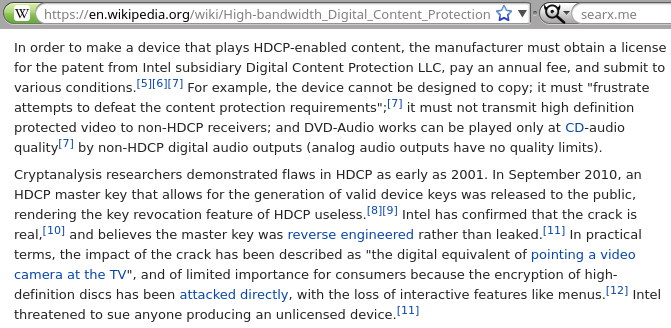Along with other malicious 'features', such as UEFI 'secure boot'

Summary: Back doors may be hard to detect (requires understanding a lot of underlying code), but how about malicious 'features' or antifeatures that are put in the kernel to serve Hollywood at the expense of the kernel's users?
OVER the past week or so Techrights has been 'data-mining' Linux. Many of the details about it will become public (in the form of IRC logs), but the gist of this exploratory effort will occasionally be published with key findings. Several software tools for exploring the kernel's source and patchset were considered and tested, in conjunction with some GNU tools that help gather statistics. There are also known caveats and these can be tackled over time.
"I would look for sudden changes in what's worked on or who is working on it," our member explained, "or maybe even changes in the rates of changes. It will require a lot of manual tweaking to get the author affiliations accurate."
This member prefers to remain anonymous.
"Gource was interesting in other ways though. You could see clearly when interest in ARM increased, same for documentation, and some other components. But by the turn of the century already it was too big to get anything useful out of it."
"Gource also has a custom format which might be of use."
As a first run, how about who puts
Intel's HDCP (DRM) in Linux? We already know
Google's role and we've seen Google promoting DRM on the World Wide Web (EME). Here's an example query:
git log --name-status -i --grep='hdcp' | \
grep -iE 'commit |Date:|Author:|Signed-Off-By:|Reviewed-By:'| \
sed -r 's/^[[:space:]]+//; s/^commit/\n&/;'
Then map those committing as well as those reviewing and signing off on the code.
"Taking into account all HDCP commits," our member explains, "there were 132 by my count. Of those, Intel and Chromium seem the big committers. I think any serious investigation would need to standardize the names first, since many use more than one e-mail address, and I have looked only for Intel.com and chromium.org domains." This yields the following:
54 Ramalingam C <ramalingam.c@intel.com>
39 Sean Paul <seanpaul@chromium.org>
17 Uma Shankar <uma.shankar@intel.com>
8 Rodrigo Vivi <rodrigo.vivi@intel.com>
3 Ville Syrjälä <ville.syrjala@linux.intel.com>
3 Tomas Winkler <tomas.winkler@intel.com>
3 Jani Nikula <jani.nikula@intel.com>
2 Imre Deak <imre.deak@intel.com>
2 Ramalingam C <ramalingm.c@intel.com>
2 Cooper Chiou <cooper.chiou@intel.com>
2 Joonas Lahtinen <joonas.lahtinen@linux.intel.com>
2 Gary Wang <gary.c.wang@intel.com>
1 Radhakrishna Sripada <radhakrishna.sripada@intel.com>
1 Daniel Kurtz <djkurtz@chromium.org>
1 Sonika Jindal <sonika.jindal@intel.com>
1 Daniel Vetter <daniel.vetter@intel.com>
1 Guenter Roeck <groeck@chromium.org>
1 Rafael J. Wysocki <rafael.j.wysocki@intel.com>
1 Anusha Srivatsa <anusha.srivatsa@intel.com>
1 Shashank Sharma <shashank.sharma@intel.com>
"Just to be clear," the member said, "the above includes reviewers and signers too."
We are going to use the tools (not just Gource but others under consideration and use) to further analyse this. We don't want to jump to any conclusions just yet, but it is widely known that Intel employees are sanitising Linux source code (with "hugs"), citing the new CoC, and there are attacks on prominent Linux developers who reject their patches. Readers probably know which Intel employees did this. We don't want to amplify their smears. We mentioned that in passing
four years ago.
We have more analysis on the way; "that will do as a start," as one might put it. As our member put it, "some of the one-time commits might be more dangerous. What does this one unlock, beyond what is shown at the surface?"
commit f699f9f9ac87f0c774cbf3b9d4b8f336221f3a88
Author: Greg Kroah-Hartman <gregkh@linuxfoundation.org>
Date: Thu Feb 28 12:55:40 2019 +0100
The
Linux Foundation does not oppose DRM; look at the Board members and who funds this foundation. It does not oppose software patents either. Does it oppose anything at all? Apparently only people who are critical of it (or its collective agenda).
⬆

